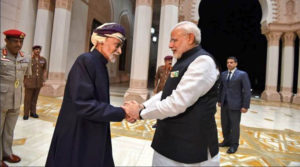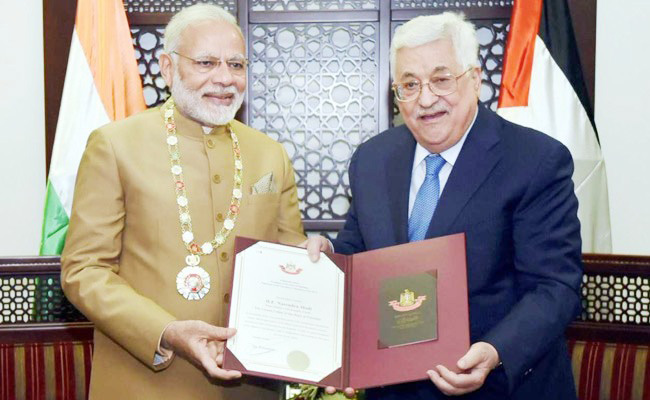Prime Minister Narendra Modi’s visit to Palestine, United Arab Emirates and Oman from February 9-12, 2018 imparted new dynamism to India’s enhanced engagement with its extended neighbourhood. The visits were infused with personal bonhomie and warmth between the leadership of these key players — with the Foreign Secretary Vijay Gokhale noting that ‘exceptional courtesies’ were extended to Mr. Modi and was reflective of the high esteem and importance they attach to a strong relationship with India.
Palestine
Mr. Modi’s visit to Ramallah (via Jordan) was historic in that it was the first prime ministerial visit to Palestine. Incidentally, the last prime ministerial visit to Jordan was by Rajiv Gandhi nearly three decades ago way back in 1988. King Abdullah himself will be making a three day visit to India from February 27.
For his three-hour long engagements in Ramallah, it was telling that Mr. Modi flew in a Jordanian helicopter escorted by Israeli helicopters. He became the first prime minister to visit the Yasser Arafat museum in Ramallah. India committed a further $40 million to its ongoing developmental assistance to Palestine, relating to the building of schools, hospitals and the setting up of a national printing press for Palestine.
On the vexing issue of the Israel-Palestine conflict, Mr. Modi affirmed that a ‘permanent solution’ will only be achieved through ‘negotiations and understanding’. In remarks ahead of Mr. Modi’s visit, Palestinian President Mahmoud Abbas flagged a possible role for India in creating a multi-lateral forum of negotiations for the Middle East Peace Process.
India voted along with 127 other countries in favour of the UN General Assembly resolution in December 2017 which aired its opposition to the policy decision of President Donald Trump to shift the American Embassy from Tel Aviv to Jerusalem, in tune with a long-standing, bi-partisan domestic US position. While India’s vote was appreciated in Palestine, Israeli Prime Minister Benjamin Netanyahu, during his January 2018 visit to India, termed the decision as ‘disappointing’ as it relates to Jerusalem, which has been Israel’s ‘eternal capital’ for more than 3000 years since the time of King David. Most analysts note that Mr. Netanyahu’s week-long visit to India in January 2018 and Mr. Modi’s three hour trip to Ramallah have successfully de-hyphenated India’s mutually distinct relationships with the two protagonists. Almost as soon as it assumed the reins of power in New Delhi, the Modi government came under pressure in Parliament for its refusal to condemn Israeli military actions in Operation Protective Edge (July-August 2014). Critics of the government accused it of abandoning India’s long-held policy positions on the Israel-Palestine conflict.
The Modi government on its part continued to reiterate that there was no such policy change, and highlighted the fact that no such demand was raised during the previous instances of Israeli military activity in the Gaza Strip in December 2008-January 2009 and November 2012, when the United Progressive Alliance (UPA) coalition government was in power. India’s diplomatic and developmental support to Palestine has meanwhile continued, with Mr. Modi receiving Abbas in New Delhi in May 2017, just ahead of his stand-alone historic visit to Israel in July 2017. In fact, Mr. Modi’s meeting with Mr. Abbas in Ramallah was the fourth such instance since the BJP government came to power.
UAE
Mr. Modi’s next trip on the agenda was to the UAE, to deliver the key note address at the World Government Summit in Dubai. He was personally received by Crown Prince Mohammad bin Zayed Al Nahyan of Abu Dhabi at the airport. The Crown Prince was the chief guest at the Republic Day celebrations in January 2017. Mr. Modi had previously visited UAE in August 2015, which was the first prime ministerial visit to that country after 34 years. Both sides had decided to elevate their relationship to a ‘comprehensive strategic partnership’ during that visit, an agreement regarding which was signed in January 2017.
The defence/security component of the ties with countries in India’s extended neigbourhood has seen a steady growth, and UAE has not been immune to this trend. Mr. Manohar Parrikar’s May 2016 visit to the UAE was the first ever such visit by an Indian defence minister. Joint air exercises were held in May-June 2016 with UAE, after a gap of eight years. The first ever bilateral naval exercises between the two countries will be held in March 2018.
While five MOUs were signed, the most significant of these relates to the MOU between the Abu Dhabi National Oil Company (ADNOC) and a consortium of Indian oil companies led by ONGC Videsh Limited (OVL) for a 10 per cent participating interest in the offshore Lower Zakhum concession. The agreement is significant for India’s energy security given that the 40 year concession allows for India to receive more than 2 million tonnes of oil every year. Indian officials note that this is the first time Indian oil companies have received oil concession anywhere in the Gulf. Another agreement related to the implementation of India’s first ever strategic petroleum reserve in Mangalore, for which six million tonnes of oil will be supplied by ADNOC. Another MOU related to DP World setting up a multi-modal logistics park in Jammu. This will be part of DP World’s committed investments of $3 billion in various projects in India. The UAE is India’s first partner in the $75 billion National Infrastructure Investment Fund (NIIF), with the Abu Dhabi Investment Agency (ADIA) joining as the anchor investor with an investment of $1 billion in October 2017. A significant cultural moment during Mr. Modi’s trip related to the laying of the foundation stone for a Hindu temple via video link.
Oman
Prime Minister Modi’s next stop was Muscat, Oman, where eight MOUs were signed, relating to cooperation in tourism, health, outer space, as well as an annexure on military cooperation, among others. An MOU on scholarly cooperation related to that between the Institute for Defence Studies and Analyses (IDSA) and the National Defence College of the Sultanate of Oman.
 Oman is one of India’s closest security/defence partners, with the MOU on military cooperation dating back to 2005 (renewed in 2016). The port of Salala provides critical logistics support to Indian naval ships in their voyages in the region. The ninth round of the Joint Military Cooperation Committee was held in April 2017 in New Delhi, with the next round to be held in Muscat in 2018. Oman extended significant assistance during ‘Op Rahat’ in March-April 2015 when Indian nationals along with other South Asians were evacuated from conflict-torn Yemen.
Oman is one of India’s closest security/defence partners, with the MOU on military cooperation dating back to 2005 (renewed in 2016). The port of Salala provides critical logistics support to Indian naval ships in their voyages in the region. The ninth round of the Joint Military Cooperation Committee was held in April 2017 in New Delhi, with the next round to be held in Muscat in 2018. Oman extended significant assistance during ‘Op Rahat’ in March-April 2015 when Indian nationals along with other South Asians were evacuated from conflict-torn Yemen.
Oman also played a critical role in securing the release of Father Tom Uzhunnalil in September 2017. He was kidnapped from the Missionaries of Charity home for the elderly in Aden in March 2016 by Islamic State terrorists in a raid that killed 16 people. Both sides agreed to intensify their cooperation in the defence/security realm, and flagged cyber security as one area where there was the imperative need for enhanced cooperation. The India-Oman Joint Statement of February 12 notes that both are ‘maritime neighbours across the Indian Ocean and the Arabian Sea’. Both sides condemned terrorism in ‘all its forms and manifestations’, emphasized on ‘the need to isolate the sponsors and supporters of terrorists’ and highlighted the India-Oman model of ‘building inclusive societies’ as effective tools to counter extremism and radicalization.
Mr. Modi’s community reception and his visit to the Motishwar Mandir built by the Gujarati business community 125 years ago highlighted the cultural connect. Over 800,000 people of Indian origin/citizens are a vibrant part of Oman’s economic life and repatriate over $3 billion of remittances — nearly four times more than the remittances the Indian community was sending back in 2008, when the last prime ministerial visit took place.
In Closing
It is indeed significant that in the first two months of 2018, India has received the heads of state from Israel and Iran — two states that are at loggerheads with each other, while Mr. Modi and External Affairs Minister Sushma Swaraj visited Palestine, UAE, Oman and Saudi Arabia respectively. These high-level visits are an acknowledgement of the success of India’s regional foreign policy in the pursuit of national interests. At the same time, they are a glowing affirmation that these countries view a robust, positive relationship with a big regional power in their neigbouhood as essential to their growth and well being.
(The author is Associate Fellow, Institute for Defence Studies and Analyses (IDSA), New Delhi.)
(The views expressed are the author's own and do not necessarily reflect the position of the organisation)

